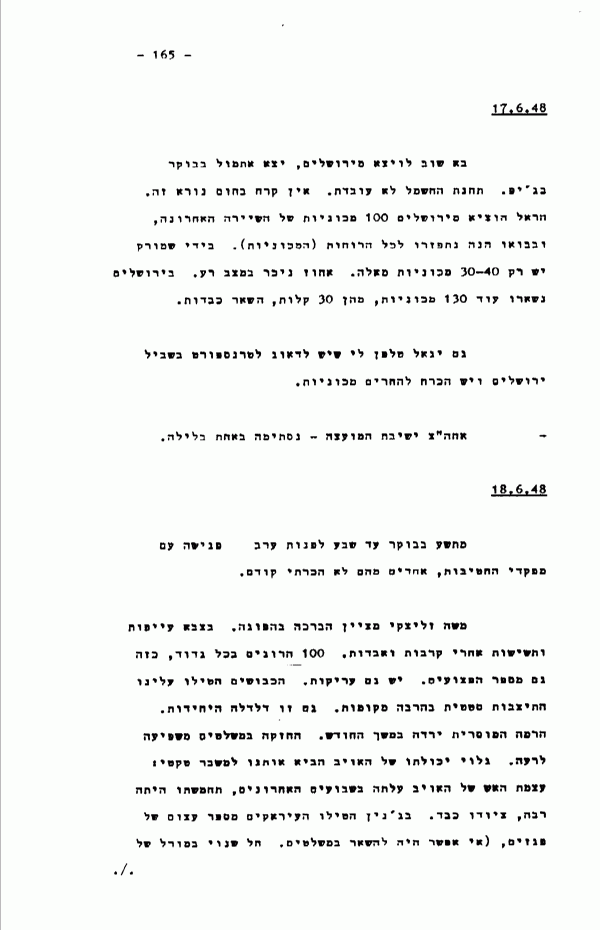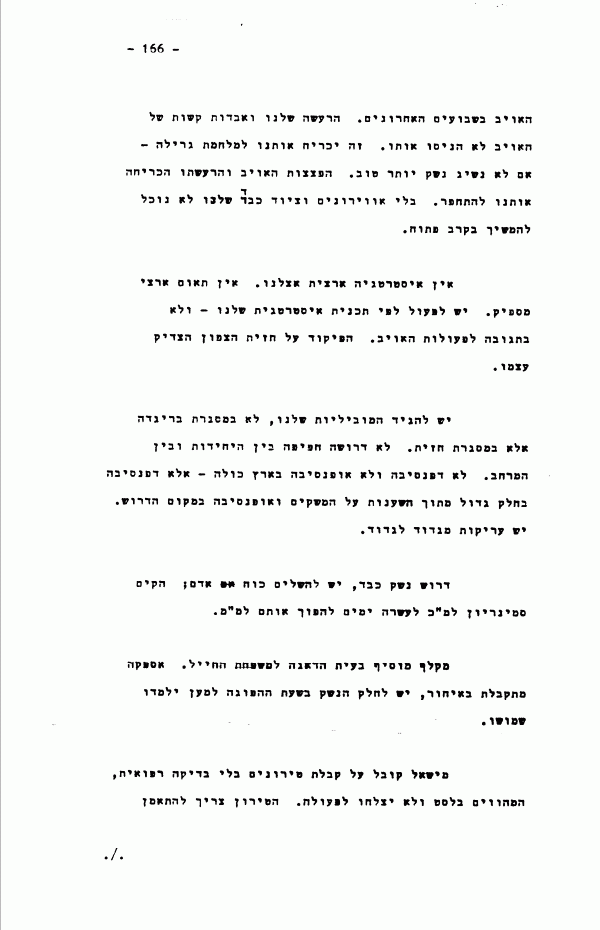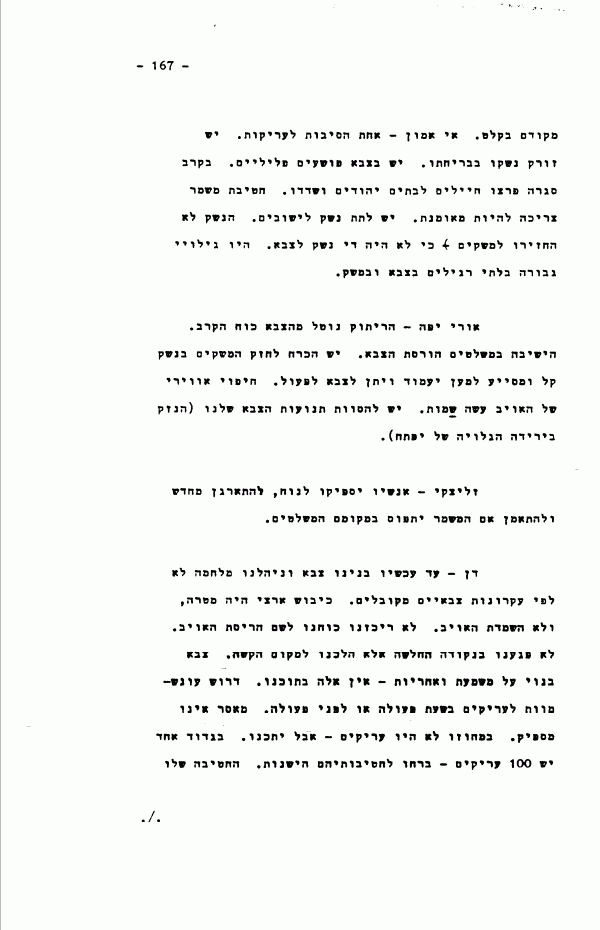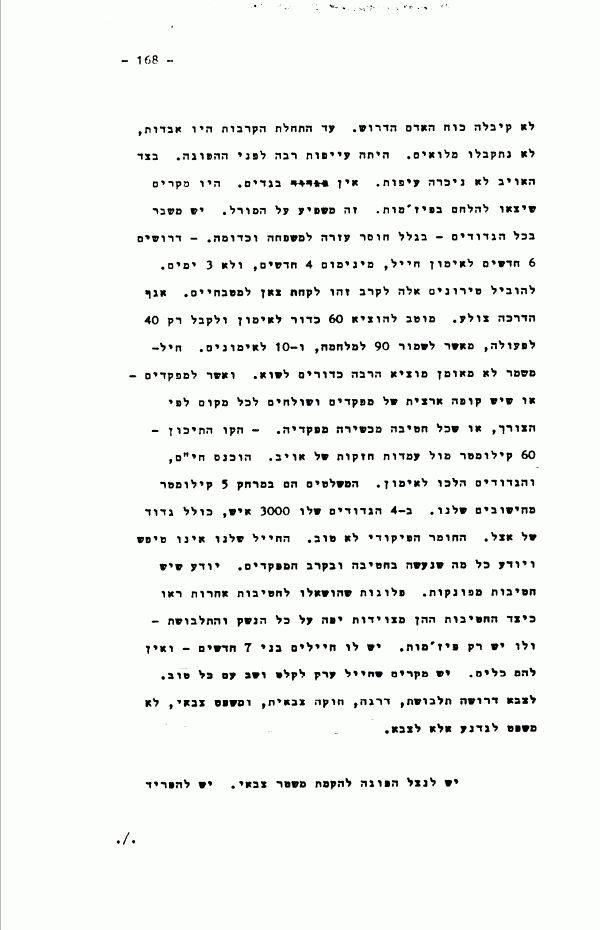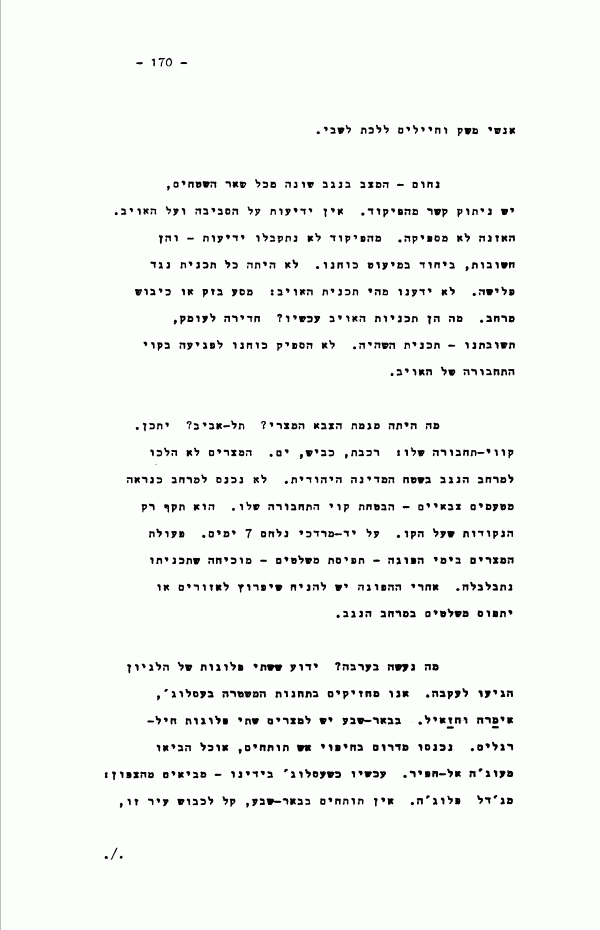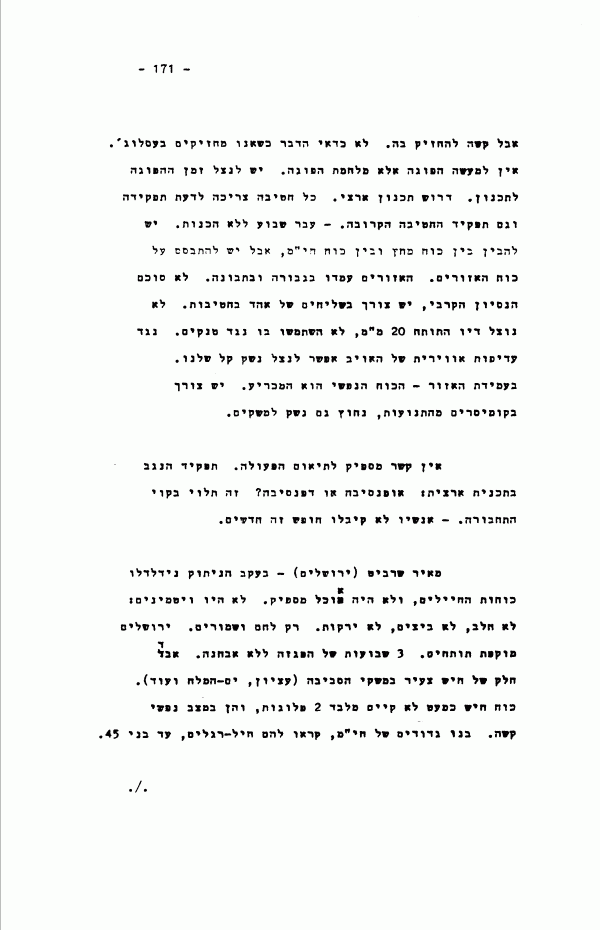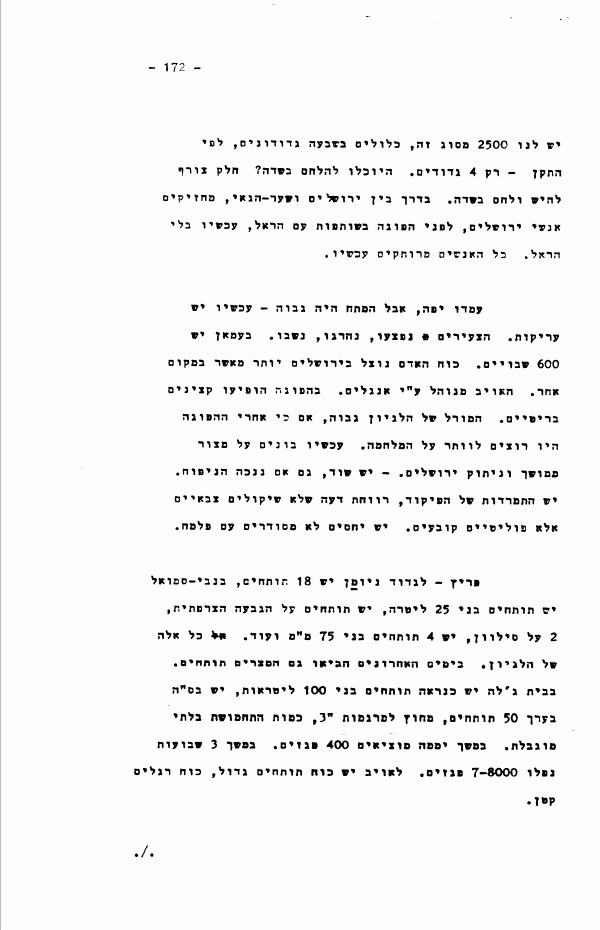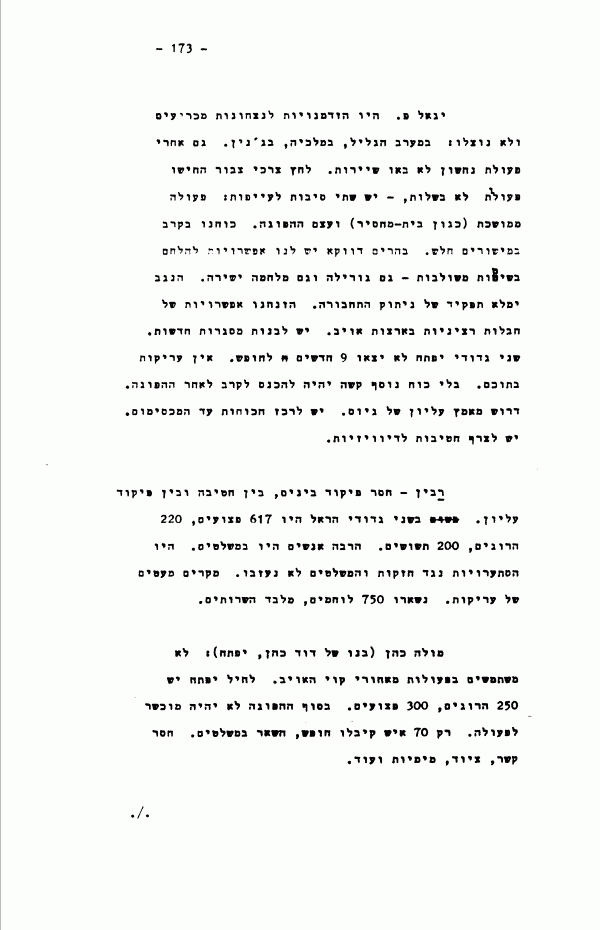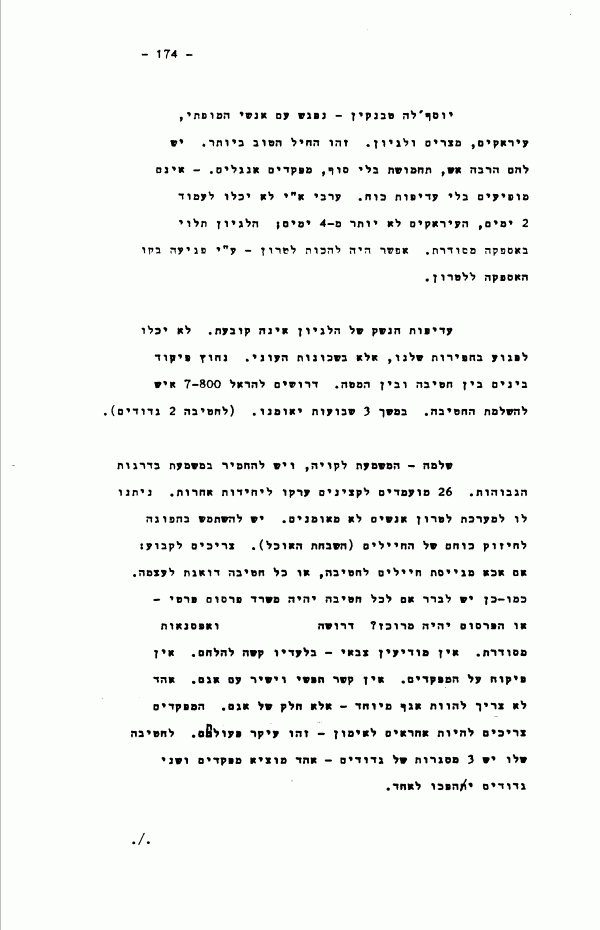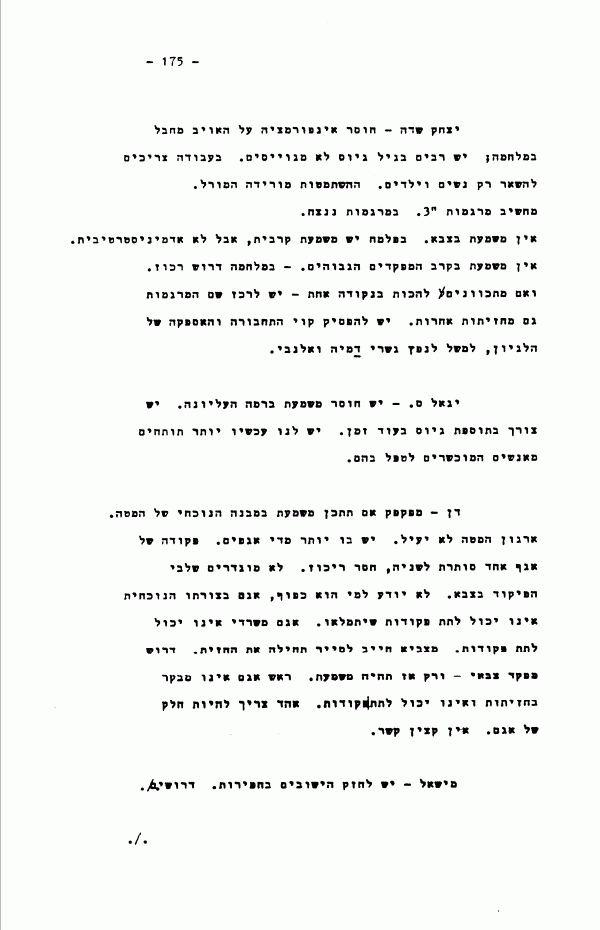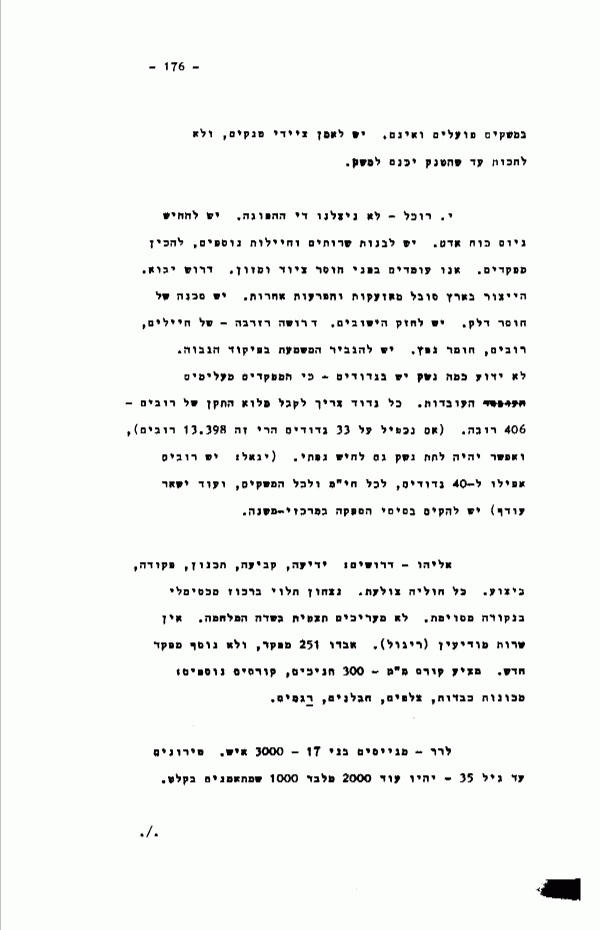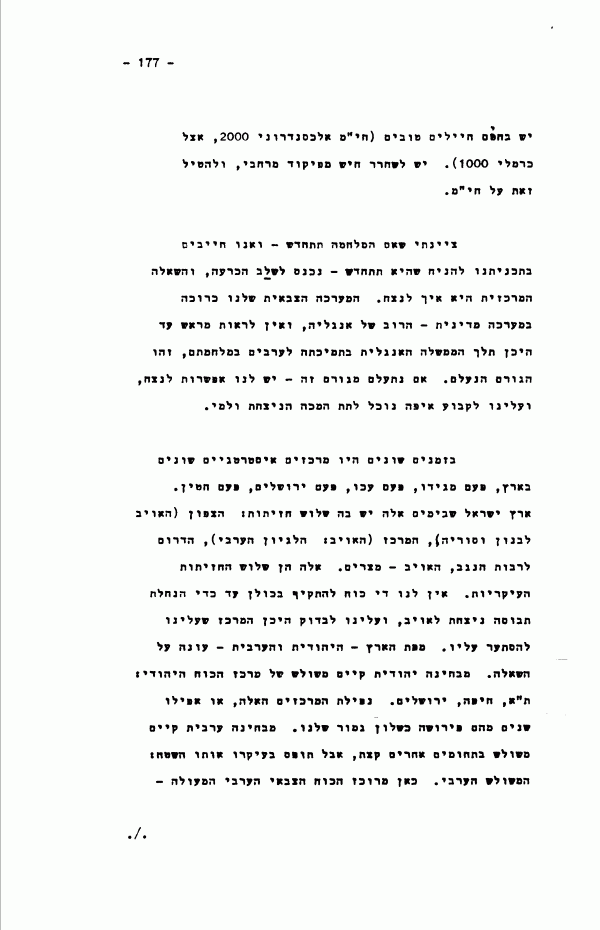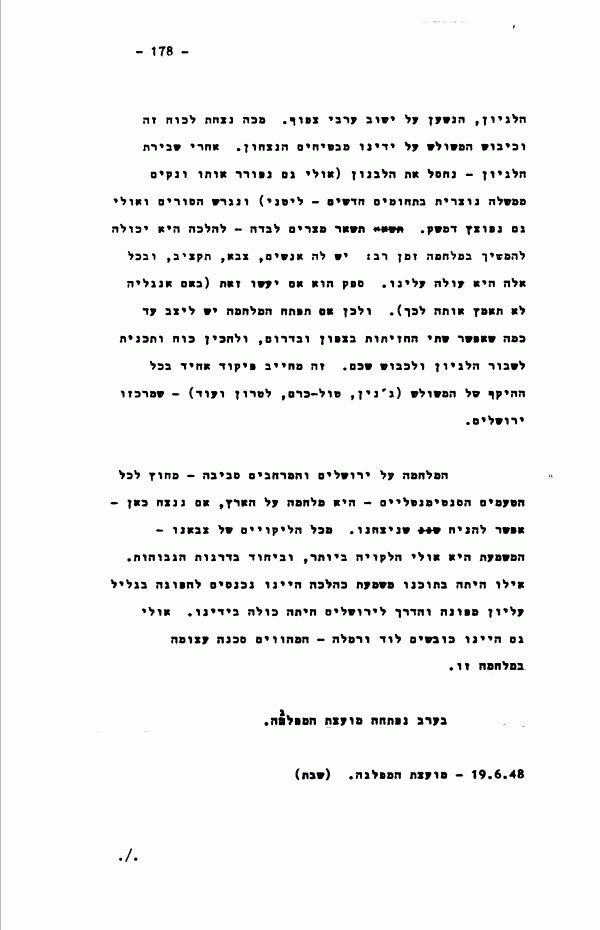[Friday,] June 18, 1948
From 9 a.m. to 7 p.m. meeting with brigade commanders, a few of whom I hadn't met earlier.
Moshe Zelicki [Carmel, northern front commander] notes that the truce is a blessing. The army is tired and exhausted after battles and losses. 100 killed in each battalion. The number of wounded is similar. There are also deserters. The conquests have necessitated our static positioning in many places. This too has diminished the units. The level of morality has declined over the month. Holding onto the strongholds has a bad influence. Our discovery of the enemy's capabilities led to a tactical crisis: The enemy's firepower increased in the past two weeks, its ammunition was plentiful, and its equipment heavy. In Jenin the Iraqis launched a massive number of shells (it was impossible to stay in the strongholds). There's been a shift in the enemy's morale in the past two weeks. Our shelling and the enemy's heavy losses didn't drive it away. This will force us into a guerrilla war - unless we acquire better weapons. The enemy's bombing and shelling forced us to entrench ourselves. Without our own airplanes and heavy equipment we won't be able to maintain open warfare.
We have no countrywide strategy. There isn't enough countrywide coordination. We need to act according to our own strategic plan - and not in reaction to enemy actions. The [unified] command over the northern front has justified itself.
We have to increase our mobility, not as brigades but as a front. There's no need for correlation between the units and the territory [i.e., brigades need not be confined to their original territory]. Neither defensive nor offensive throughout the country - but defensive in large part, with reliance on the settlements, and offensive where necessary. There are desertions from one battalion to another. Heavy weaponry is needed. We need to further train the personnel, establish a ten-day seminar for squad commanders - to turn them into platoon commanders.
[Mordechai] Makleff [Carmeli Brigade commander] also notes the problem of providing for the soldier's family. Supplies [for units] arrive late. Weapons should be distributed during the truce, so that [troops] learn how to use them.
Mishael [Shaham, interim commander of the Golani Brigade] complains about the enlistment of new recruits without medical exams. [They] constitute ballast [a burden] and won't be successful in action. The new recruit needs to undergo training earlier, during processing. Lack of training is one of the reasons for desertion. Some discard their weapons when they run off. There are criminals in the army. During the Sejera battle soldiers broke into Jewish homes and robbed them. The garrison brigade [garrison force] needs to be trained. Weapons should be given to the settlements. The weapons [that were taken for Nahshon and the formation of brigades] hasn't been returned to the settlements - because there weren't enough weapons for the army. There were exceptional demonstrations of bravery in the army and the settlements.
Uri Yaffe [sp.] [Oded Brigade commander] - the confinement is depleting the army's fighting spirit. Sitting in strongholds is destroying the army. It's imperative that the settlements be reinforced with light and auxiliary weapons so that they can hold on, and allow the army to operate. The enemy's air cover wreaked havoc. Our army's mobilizations have to be camouflaged (the damage from the visible descent [relocation] of Yiftah).
[Moshe] Zelicki [Carmel] - his men will manage to rest, regroup, and train if the guard [garrison force] replace them in the strongholds.
Dan [Even, Alexandroni Brigade commander] - so far we have built an army and waged war not on the basis of customary military principles. Land [territorial] conquest was the goal, rather than destruction of the enemy. We didn't concentrate our forces for the sake of destroying the enemy. Rather than striking at the weak point we went to the hard place. An army is built on discipline and responsibility - we don't have these within us. The death penalty should apply to those who desert during or before an operation. Imprisonment is not enough. In his district there were no deserters - but there could be. In one battalion there are 100 deserters - they fled to their old brigades. His brigade did not receive the necessary manpower. With the start of hostilities there were losses. Reserves did not arrive. [The troops] were very tired before the truce. The enemy did not appear to be tired. Clothes are lacking. There were cases of fighters setting out in pajamas. This affects morale. All the battalions are in crisis - because of lack of assistance to families and so on. Training a soldier requires 6 months, minimum 4 months, not 3 days. Taking these new recruits into battle is leading lambs to the slaughter. The Training Department is limping along. It's better to use up 60 bullets in training and receive only 40 for action than to save 90 for war and have 10 for training. The garrison force is not trained, and expends many bullets needlessly. And as to commanders - either there's a national pool of commanders and they're sent wherever they're needed, or each brigade trains its own commanders. Along the central [front]line - [a stretch of] 60 km facing strong enemy positions - garrison forces were brought in and the battalions left for training. The strongholds are 5 km from our settlements. His 4 battalions comprise 3,000 men, including an IZL battalion. The commander material is not good. Our soldier is not stupid and knows everything that's happening in the brigade and among the commanders. He knows that there are pampered brigades. Companies that were seconded to other brigades saw how well-equipped those brigades were in terms of weapons and ammunition and clothing - and he only has pajamas. He had soldiers of 7 months - with no weapons. There are cases of a soldier deserting to [the] processing [center] and returning with the best of everything. The army requires uniforms, ranking, military law, and a military judiciary, not a judiciary for Gadna but for the army.
We need to take advantage of the truce to establish a military structure. We need to differentiate between territorial organization and brigade organization. The subdistrict will come under static command - with a garrison force and settlement men at its disposal.
James [Michael Ben-Gal, Kiriati commander] - the meager grants to families undermine morale. The age in Tel Aviv is old. There's a problem of Haganah old-timers - they won't tolerate too much promotion of youngsters [in command]. We need to give grades [rank insignia]. The time factor assessment is incorrect. [Men] should not be sent to battle without training because then the good ones, who don't flee, are killed. There's no shortcut. It is actually possible to train without necessarily taking 4 months. We need to use elderly material [human resources] - in order to free up youngsters for combat.
Shimon Koch [Avidan, Givati Brigade commander] - 70% of his force is pinned down, and there's no room for talk about training and reorganization. The morale is okay, and [our] strength lies in the morale. But there's no morale without shoes, payments to families, the situation on the home front. Does not believe in punishments. The Egyptians were agitated at first, then they settled down, entrenched themselves, displaying heavy weaponry where necessary. They were happy about the truce. It was a mistake to collect weapons from the settlements and take men - the settlements should be given men and weapons so that they can hold on. Our fortifications are not enough - entrenchments and entrenchment tools are needed.
The service list isn't suited to a military unit. Need to expand the services, such as sanitary, in the battalion.
There's POW propaganda in the press - they're praising the conduct of the Legion and the good imprisonment conditions. Settlement people and soldiers acted traitorously in going off as POWs.
Nahum [Sarig, Negev Brigade commander] - the situation in the Negev is different from everywhere else. Communication with the command is severed. There's no information about the surroundings or the enemy. Eavesdropping is not enough. Notices [about the enemy] weren't received from the command - and they're important, especially given the small size of our force. There was no plan whatsoever against invasion. We didn't know what the enemy's plan was, a swift maneuver or territorial conquest. What are the enemy plans now? In-depth penetration. Our response - a delaying tactic. Our force was not enough to strike at the enemy's transport routes.
What was the Egyptian army's objective? Tel Aviv? Possibly. Its transport routes: railway, road, sea. The Egyptians didn't go to the area of the Negev within the Jewish state's territory. [Their army] didn't enter the area, probably for military reasons - the assurance of its transport routes. It only attacked points along the line [its axis of movement]. It fought over Yad Mordechai for 7 days. The Egyptians' activity during the truce - capturing strongholds - proves that its plan went awry. After the truce it will presumably invade [other] areas or capture strongholds in the [Jewish-held] area of the Negev.
[Ben-Gurion]: What is happening in the ''Arava?
[Sarig]: We know that two of the Legion's companies have reached ''Aqaba. We have ahold of the police stations in ''Isluj, ''Imara [near Tkuma], and Huzeil [the area of the al-Hozayel Bedouin tribe, near Shoval]. In Beersheva the Egyptians have two infantry companies that entered from the south [in fact - from the Gaza Strip] under cover of cannon fire. They brought food from Auja al-Hafir. Now, with ''Isluj in our hands - [they're] bringing [it] from the north: from Majdal, from Faluja. There are no cannons in Beersheva; it's easy to conquer this town but hard to hold onto it. This isn't advisable when we have ''Isluj. In fact, there's no truce, but rather a truce war. We should exploit the truce period for planning.
We need a countrywide plan. Every brigade needs to know its role and the role of the nearest brigade. A week has passed without preparations. We need to differentiate between a strike force and a garrison force, but need to rely on area forces [the settlements, which constitute the garrison "areas"]. The areas held on, bravely and intelligently. The battle experience hasn't been summed up. We need Training Department representatives in the brigades. The 20 mm cannon wasn't fully exploited. It wasn't used against tanks. We can exploit our light weapons against the enemy's aerial superiority. In terms of an area's fortitude - mental strength is decisive. There's a need for commissioners [public relations personnel] from the movements. We also need weapons for the settlements.
Communication is inadequate for coordination of action: [What is] the Negev's role in the countrywide plan, offensive or defensive? It depends on the transport routes. His men haven't had a leave in months.
Meir Sharvit [sp.] (Jerusalem) [deputy commander of the brigade] - because of the disconnection, the soldiers' strength dwindled, and there wasn't enough food. There were no vitamins: no milk, no eggs, no vegetables, only bread and canned food. Jerusalem is surrounded by cannons. 3 weeks of indiscriminate shelling. Some of the young Hayish were lost to nearby settlements (Etsiyyon, Dead Sea, etc.). The Hayish force is almost nonexistent, aside from 2 companies, and they're in a difficult state mentally. They established garrison battalions, called them infantry, up to age 45. We have 2,500 [men] of this type, in seven battalions. According to the service list, [they should be] only 4 battalions.
[Ben-Gurion]: Will they be able to fight in the field?
[Sharvit]: Some were added to Hayish and fought in the field.
Jerusalem men control the road between Jerusalem and Sha'ar HaGai, before the truce jointly with Harel, now without Harel. All the men are pinned down now. They stood strong, but the pressure was intense. Now there are desertions. The young ones were injured, killed, taken prisoner. In Amman [actually - Mafraq] there are 600 POWs. The manpower was exploited in Jerusalem more than anywhere else. The enemy [the Legion] is being managed by England. With the truce there appeared British officers. The Legion's morale is high, although after the truce they'd like to stop fighting. Right now they're counting on a prolonged siege and the severing of Jerusalem.
There's theft, even if we deduct the volume [of exaggerated reports]. There's rebellion by the command. There's a widespread belief that political rather than military considerations are determining [the course of action]. Relations with the Palmach are not systematized.
Fritz [Shalom Eshet]: Newman's battalion [the Legion's 3rd Battalion] has 18 cannons. At Nebi Samwil there are 25-pound cannons. There are cannons on the French Hill, 2 on Silwan, there are four 75 mm cannons, and more. All these are the Legion's. In recent days the Egyptians also brought cannons. In Beit Jala there are apparently 100-pound cannons. In total there are 50 cannons, aside from 3" mortars. The amount of ammunition is unlimited. Over a 24-hour period they launch 400 shells. Over the course of 3 weeks, 7,000-8,000 shells landed. The enemy has much artillery power, little infantry power.
Yigal P. [Allon, Marcus's deputy on the Jerusalem front and his successor after his death]: There were opportunities for decisive victories that were not seized: in the Western Galilee, in Malkiyya, in Jenin. Even after Operation Nahshon, convoys did not come [to Jerusalem]. The pressure of public needs prompted premature actions. There are two reasons for the fatigue: prolonged action (such as Beit Mahsir) [in Operation Maccabi] - and the fact of the truce. Our force when fighting on the plains is weak. In the hills we actually have possibilities for integrated fighting - both guerrilla and direct warfare. The Negev will play a part in severing transport [for the enemy].
We neglected opportunities for serious sabotage in enemy countries. We need to create new units. Two Yiftah battalions haven't had a leave in 8 months. There are no desertions among them. Without additional force it will be hard to go to battle after the truce. A supreme effort is needed for conscription. Forces should be concentrated to the maximum.. Brigades should be combined into divisions.
Yitzhak [Rabin, Yigal Allon's deputy]: Intermediate command, between the brigade and the High Command, is missing. In two Harel battalions there were 617 wounded, 220 killed, 200 exhausted. Many men were in the strongholds. There were strong counter-attacks and the strongholds weren't abandoned. Few cases of desertions. 750 fighters remained. Aside from the services.
Mulah Cohen (son of David Cohen, Yiftah [Brigade commander]): [We're] not making use of action behind enemy lines. Yiftah has 250 dead, 300 wounded. At the end of the truce it won't be fit for action. Only 70 men received leave, the rest are in strongholds. Signal [equipment], equipment, water canteens, etc. are lacking.
Yosef-le Tabenkin [Harel Brigade commander]: Came across the Mufti's men [in battle], Iraqis, Egyptians, and the Legion. This is the best armed force. They have a lot of firepower, unlimited ammunition, English commanders. They don't show up without a power advantage. Eretz-Israel Arabs couldn't hold on 2 days. The Iraqis no more than 4 days; the Legion depends on orderly supplies. It would've been possible to strike at Latrun - by striking at the supply route to Latrun.
The Legion's weapons advantage is not determinative. They weren't able to damage our trenches, only poor neighborhoods. We need an intermediate command between brigade and [the General] Staff. Harel needs 700-800 men to complete its brigade. Over the course of 3 weeks, 2 battalions will be trained for the brigade.
Shlomo [Shamir, 7th Brigade commander]: Discipline is lacking, and it's necessary to be stricter about discipline in the high ranks. 26 officer candidates deserted to other units. I was given untrained men for the Latrun battle. The truce should be used to enhance the soldiers' strength (improve the food).
Need to decide: Does the Personnel Department enlist soldiers for the brigade, or does each brigade take care of itself. Likewise, need to clarify whether each brigade will have its own private publicity office - or whether publicity will be centralized? Need orderly provision of goods and logistics. There's no military intelligence - without that it's hard to fight. There's no supervision over the commanders. There's no unrestricted and direct communication with the Operations Department. The Training Department doesn't need to be a special department - but part of the Operations Department. The commanders need to be responsible for training - that's the essence of their activity.
His brigade has 3 formations of battalions. [But] the Training Department is taking [back] commanders and two battalions became one [the 7th Brigade was hastily formed by enlisting Training Department men].
Yitzhak Sadeh: Lack of information about the enemy undermines warfighting; many draft-age [men] are not being conscripted. Only women and children should remain working. Draft dodging lowers morale. He sees 3" mortars as important. With mortars we'll win.
There's no discipline in the army. In the Palmach there's warfighting discipline, but not administrative [discipline]. There's no discipline among the senior commanders - war requires concentration. And if there are plans to strike a [specific] point - then mortars from other fronts should be concentrated there as well. The Legion's transport and supply routes should be severed, for example by completely blowing up the Damiye and Allenby Bridges.
Yigael S. [Yadin]: Discipline is lacking at the highest level [of command]. More conscripts will be needed soon. Right now we have more cannons than people who are trained to handle them.
Dan [Even]: Doubts whether discipline is possible with the Staff's present structure. The Staff is inefficiently organized. It has too many departments. One department's order contradicts another's. Coordination is lacking, [and] the levels of command in the army haven't been defined. [Dan] doesn't know who he's subordinate to. The Operations Department in its present form cannot issue an order that would be followed. An administrative Operations Department cannot issue orders. A military leader must first tour the front. We need a military commander - and only then will there be discipline. The Operations Department head does not visit the fronts and cannot issue orders. The Training Department needs to be part of the Operations Department. There's no liaison officer
Mishael [Shaham]: The settlements have to be fortified with trenches. The [agricultural] settlements need workers and don't have them. We need to train tank hunters, and not wait until the tank enters the settlement.
Y. Rochel [Avidar]: We haven't taken full advantage of the truce. We need to expedite the recruitment of manpower. We need to create additional services and corps. To prepare commanders. We're going to face a lack of equipment and food. We need to import. Production in the country suffers from [air-raid] alarms and other disruptions. There's a risk of a fuel shortage. The settlements need to be strengthened. There's need for a reserve - of soldiers, rifles, explosives. Discipline in the High Command needs to be increased. We don't know how many weapons the battalions have - because the commanders are concealing the facts. Every battalion needs to receive the full designated amount of rifles - 406 rifles (if we multiply by 33 battalions, this means 13,398 rifles), and we'll also be able to give weapons to subdistrict Hayish. (Yigael [Yadin]: There are even enough rifles for 40 battalions. For all the garrison forces and all the settlements, with some left over). Supply bases have to be set up in supplementary centers.
Eliahu [Ben-Hur]: We need: information, decision-making, planning, an order-giving process, execution [of operations]; each [of these] link[s] is weak. Victory depends on maximal concentration on a certain point. The value of battlefield observation [posts] is not recognized. There's no intelligence and espionage service. 251 commanders have been lost, and no new commander has been added. He proposes a platoon commander course - 300 trainees; additional courses: heavy machine [gun]s, snipers, demolitions specialists, mortarmen.
Lehrer [Moshe Zadok]: We're conscripting 17-year-olds - 3,000 men. New recruits up to age 35 - there'll be another 3,000, in addition to 1,000 undergoing training in processing [centers]. There are good soldiers among them (garrison, Alexandroni 2,000, for Carmeli 1,000). Hayish needs to be released from territorial command, which should be assigned to garrison forces.
[Ben-Gurion:] I noted that if the war resumes - and in our planning we must presume that it will - we'll be entering a decisive phase, and the main question is how to win. Our military struggle entails a diplomatic struggle - England's quarrel [with us], and we can't foresee how far the English government will go in its support for the Arabs in their warfighting. This is the unknown factor. If we ignore this factor - then we have a possibility of winning, and we need to decide where we can deliver the victorious blow and to whom.
At different times there were different strategic centers in the country, at one time Megiddo, at one time Acre, at one time Jerusalem, at one time [Karnei] Hittin. But in present-day Israel, there are three fronts: the north (the enemy - Lebanon and Syria); the center (the enemy - the Arab Legion [and the Iraqi Expeditionary Force]); the south, including the Negev (the enemy - Egypt). These are the three main fronts. We don't have enough power to attack all of them so as to defeat the enemy decisively, so we must examine where the center that we should attack is. The map of the country - the Jewish [one] and the Arab [one] - answers the question.
From the Jewish perspective, the Jewish center of power forms a triangle: Tel Aviv, Haifa, Jerusalem. The fall of these centers, or even two of them, means complete failure for us. From the Arab perspective, there's a triangle in slightly different zones, but in principle it covers the same area: the Arab triangle. This is where the excellent Arab military power is concentrated - the Legion, which relies on dense Arab settlement. A decisive blow against this force and our conquest of the triangle ensure victory.
After crushing the Legion - we'll destroy [the] Lebanon [army] (maybe we'll also dissolve it and set up a Christian government in new zones - Litani), and we'll expel the Syrians, and maybe also explode [bomb] Damascus. Egypt will be left on its own. In theory it could continue to wage war for a long time: it has men, an army, a budget, and in all these respects it surpasses us. It's doubtful that it would do this (unless England urges it to do so). And therefore if war starts, we should strengthen the two fronts in the north and the south as much as possible, and prepare a force and a plan to crush the Legion and conquer Nablus. This requires a unified command throughout the triangle (Jenin, Tulkarm, Latrun, etc.) - with Jerusalem as its center. The war over Jerusalem and its surrounding areas - aside from all the sentimental reasons - is a war over the country; if we win here - we can assume that we won.
Of all our army's deficiencies - discipline is perhaps the most deficient, and especially at the higher ranks. If we had proper discipline within us, we would have entered the truce with the Upper Galilee cleared, and the road to Jerusalem would be entirely in our hands. Perhaps we would have also conquered Lod and Ramle - which pose a great danger in this war.
In the evening the party council meeting opened.





